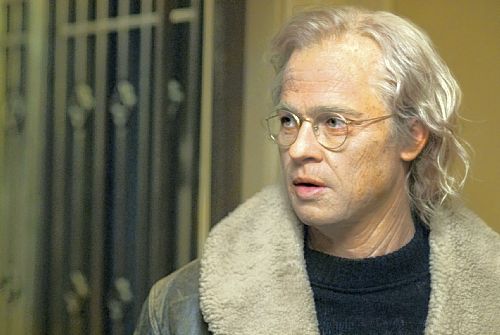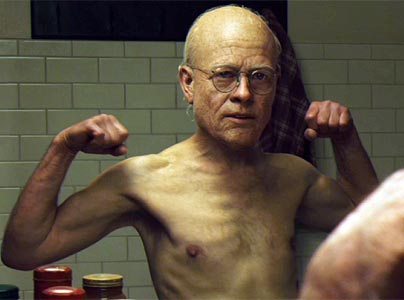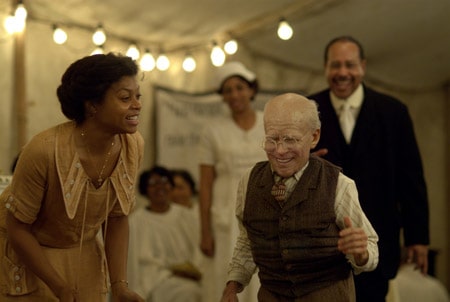
David Fincher has long been my favorite director, so it’s understandable that I was never anxious for the release of a film as I was for The Curious Case of Benjamin Button. Loosely based on the short story by F. Scott Fitzgerald, Ben Button is the tale of an individual who begins life as an old man and ages backwards. Tons of hype surrounded this movie, but was this film Fincher’s magnum opus? Perhaps – it’s possibly Fincher’s most well-made film, although it does have a few minor flaws. Keep reading for my full review of The Curious Case of Benjamin Button (major spoilers):
Although the film clocks in at a running time of nearly three hours, I don’t think that’s a big problem. A movie is too long only if it becomes redundant or features unnecessary scenes, and Ben Button, despite its length, seemed to present only what was essential to the story. There’s not much conflict in the film, but this movie was also more of a potrait than anything else, exploring themes of loss, love, and mortality from beginning to end. Before I get to the flaws, I’d like to discuss what I really liked about the movie.

The theme of loss is prevalent throughout the movie and becomes even more poignant as a result of Benjamin’s backward aging. When someone grows old, we can approximate that he will die soon, but when someone is growing young, the end of his life becomes definite and easily determined. The limitations of time and life itself are highlighted by this reversed aging, creating a somber tone that lingers throughout the film. Perhaps my favorite part of the movie was when Benjamin and his love, Daisy, had “met in the middle” and moved into an apartment together, spending countless hours doing nothing but enjoying each other’s company. Knowing that their time in the middle is fleeting and cannot last, Benjamin and Daisy make the best of it and savor this little slice of life that will inevitably escape them and become a bittersweet memory.
Next, Brad Pitt has shown that he’s a terrific actor, but it’s Cate Blanchett who really shines in this film. She’s been acclaimed in the past, and rightfully so, but Cate’s portrayal of Daisy gives us a character who is fully believable, whether she is in the big city promiscuous phase of her life or her settled, motherly phase.
Visually, The Curious Case of Benjamin Button is breathtaking. Fincher can frame a shot as well as anyone working today, and Ben Button is filled with gorgeous, iconic imagery. I wonder if Fincher used a special type of film when he shot – like he did when shooting Se7en – because the stark contrasts in color are simply stunning. Whether it was the shot of the sun rising off the pier, Benjamin and Daisy swimming as a shuttle lifted off in the distance, or Benjamin riding his motorcycle and looking like James Dean, nearly every scene in Fincher’s work is a pleasure to behold. Best of all, the CGI is merely an afterthought and at no point becomes a distraction.

So what didn’t I like about Benjamin Button? Not too much, to be honest, but I suppose there are a few minor flaws. For one, the love between Daisy and Benjamin seems to be, well, convenient. There’s nothing particularly intriguing about Benjamin aside from the obvious; there’s no real reason for Daisy to fall for him, but without their relationship, the movie wouldn’t be much at all. Benjamin is devoid of any particular character traits and is in fact sort of bland, but I think that may be intentional (or I’m just a huge Fincher apologist). By showing that Button is a generic every man, the film can appeal to everyone, and audiences can easily empathize with Benjamin and his sense of loss. It’s something with which we must all come to grips at some point or another, regardless of our ages.
Really, the above criticism applies to the script, as Fincher and his cast have done a remarkable job with the material. One could argue that The Curious Case of Benjamin Button is a fable, but without the campiness of the inferior Forrest Gump. Benjamin Button isn’t the type of film we’ve come to expect from Fincher, but he’s managed to create a gorgeous film that subtly delivers various universal themes. This film isn’t for everyone – it’s length and absence of conflict make it less than ideal for the masses – but it’s definitely one of the better movies I’ve seen.
 Follow Us
Follow Us





